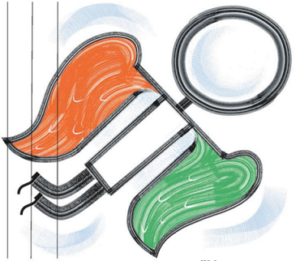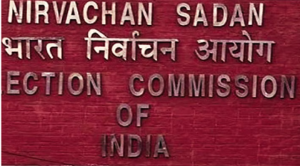The EC’s Gaurdrails.
Relevance
- GS Paper 2
- Appointment to various Constitutional posts, powers, functions and responsibilities of various Constitutional Bodies.
- Separation of powers between various organs.
Why in News?
The government tabled the Chief election Commissioner and other Election Commissioners (Appointments, Conditions of Service, Term of Office) Bill in the Rajya Sabha. This comes after the Supreme Court’s landmark verdict in March on the appointment process of polling officials.
Upholding Democracy in a Changing Landscape – The need to ensure independence:
- Amidst a global erosion of trust in electoral institutions, maintaining the institutional autonomy of the ECI becomes imperative.
- According to the Gallup World Poll, voter confidence in election integrity stands at only 50% in India and 40% in the USA, underlining the need for bolstering the credibility of election processes.
- Within India, concerns have arisen regarding bias in election scheduling, arbitrary deletion of voter names, and perceived violations of the model code of conduct.
The SC verdict that lead to the bill:
- The Supreme Court’s unanimous verdict emphasized the significance of a collegium in the appointment process of the Chief Election Commissioner (CEC) and ECs.
- SC ruled a panel comprising the Prime Minister (PM), the Leader of the Opposition (LoP), and the CJI, shall appoint CEC and ECs until Parliament brings a law while underlining the independence of the Election Commission of India (ECI) requires a collegium.
- The court said that the purity of the election process must be maintained to preserve democracy or else it would lead to disastrous consequences.
Proposed Changes In The Bill:
- Bill says the panel for appointments of CEC and ECs shall comprise the PM, LoP in the Lok Sabha, and a Cabinet minister.
- Search Committee: The bill introduces a positive addition – a search committee led by the Cabinet Secretary, tasked with preparing a panel of five candidates for consideration.
- CEC will be appointed amongst persons who are holding or have held a post equivalent to the rank of secretary.
- EC will be considered as par with CEC when removal is considered. They too can only be removed only through the process of impeachment like a SC judge.
Avenues for Improvement: Tackling Partisanship and Enhancing Transparency
- Unanimous decisions: If the collegium were to give unanimous decisions, than Leader of opposition will have veto thus ensuring transparency.
- Member from judiciary: As stated in SC judgement inclusion of CJI on collegium will bring more autonomy and independence to EC.
The Election Commission of India’s reputation as a symbol of democratic integrity is at stake. A balanced approach that ensures institutional autonomy, addresses partisanship concerns, and enhances the credibility of the EC is imperative. Though the bill is a positive step but By refining the proposed collegium system, incorporating unanimous decisions, and protecting the shortlisting process, India can establish a robust and impartial mechanism for selecting Election Commissioners.
| What is the Election Commission of India?
· The Election Commission of India (ECI) stands as an independent constitutional authority entrusted with the task of overseeing both Union and State election proceedings within India. · This entity holds the responsibility of conducting elections for the Lok Sabha, Rajya Sabha, and State Legislative Assemblies in India. Moreover, it also manages the electoral processes for the positions of the President and Vice President within the nation. · It is important to note that the Election Commission’s purview does not extend to panchayat and municipality elections in the states. These elections are instead governed by separate State Election Commissions, as outlined in the Constitution of India. Constitutional Provisions: · Part XV (Article 324-329) of the Indian Constitution: It deals with elections and establishes a commission for these matters. · Article 324: Superintendence, direction and control of elections to be vested in an Election Commission. · Article 325: No person to be ineligible for inclusion in, or to claim to be included in a special electoral roll on ground of religion, race, caste or sex. · Article 326: Elections to the Lok Sabha and Legislative Assemblies of States to be on the basis of adult suffrage. · Article 327: Power of Parliament to make provision with respect to elections to legislature. · Article 328: Power of Legislature of a State to make provision with respect to elections to such Legislature. · Article 329: Bar to interference by courts in electoral matters. Structure of ECI: · The Election Commission of India (ECI) has evolved from a single election commissioner to a multi-member body following the ECI Amendment Act 1989. · The commission comprised one Chief Election Commissioner and two Election Commissioners. · At the state level, the Chief Electoral Officer, an officer of the Indian Administrative Service (IAS), assists the commission. · Members serve a term of six years or until the age of 65, whichever comes first. · They enjoy the same status, salary, and benefits as judges of the Supreme Court of India. Removal: · They can resign anytime or can also be removed before the expiry of their term · The CEC can be removed from office only through a process of removal similar to that of a SC judge by Parliament. Powers of ECI: The powers vested in the Election Commissioners of India are categorized into three types: Administrative Powers, Advisory Powers, and Quasi-judicial Powers. Administrative Powers: · The Election Commission holds crucial administrative authority over supervising, directing, and controlling election proceedings. · Article 324 confers various tasks on the Commission, spanning administrative, judicial, and legislative spheres. Advisory Powers: · In cases of corrupt practices during elections, the President decides whether a convicted person should be disqualified from future elections and for how long. · Prior to making a judgment, the President seeks advice from the ECI and may act upon it based on the circumstances. Quasi-Judicial Powers: · The Election Commission is mandated to undertake a significant role in registering political parties. · Political parties intending to contest elections under a specific name and symbol must register with the ECI. · The Supreme Court has ruled that the ECI’s registration of political parties is a quasi-judicial function.
|
Sources: https://epaper.indianexpress.com/3746929/Delhi/August-11-2023#page/15/1
Mains Question:
Q “Discuss the Mechanisms Upholding the Independence of the Election Commission of India” 250 words.





